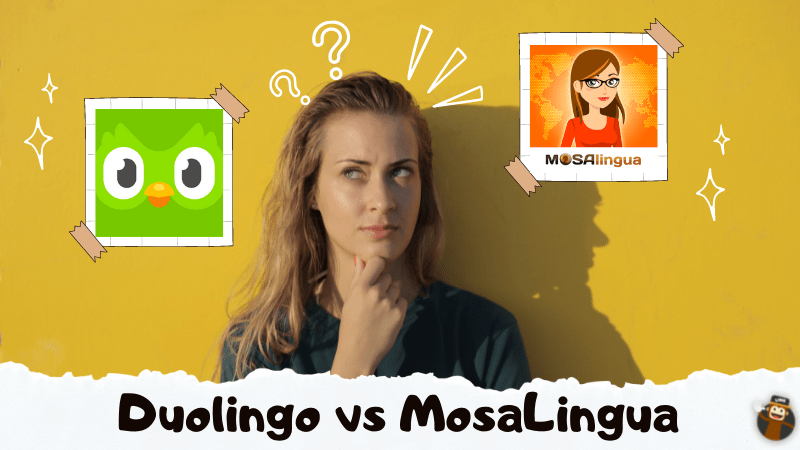Is learning a new language one of your goals this year? If yes, then this MosaLingua VS Duolingo review is perfect for you! There are plenty of language learning apps on the market nowadays, and we don’t want you to waste your time using inefficient or non-professional language learning apps. To learn whether these two platforms are worth your time, we created this post to walk you through the apps’ features and pros and cons. Are you ready? Let’s get started!
Mosalingua App: First Look
Mosalingua is a language learning app that offers eight foreign languages. It has been used by millions of learners worldwide, and it has such positive feedback on different platforms that we wanted to take a look at it. The platform s based on the flashcard technique. It is designed to teach you new vocabulary words and phrases and a sum of grammar. The app works with the MosaLearning method, a combination of 6 different language learning methods. We will discuss this in the features section below.
Features Of Mosalingua
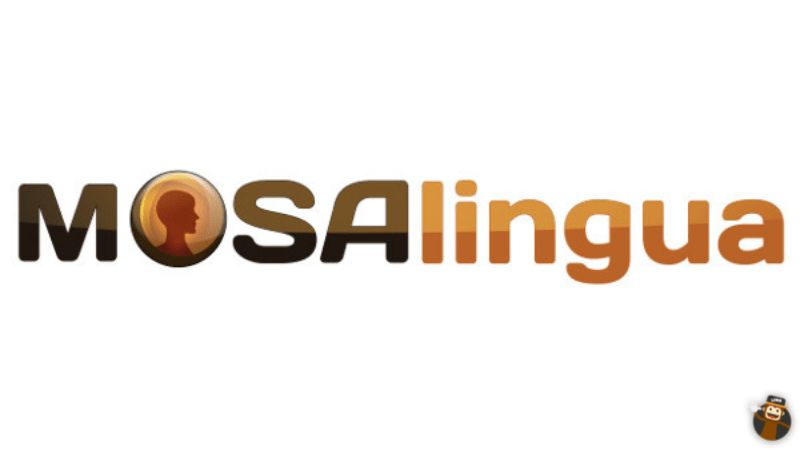
The Spaced Repetition Method
We all know that the only way to learn vocabulary is to memorize them, and most language learning apps use this method. The thing is how to keep these words and phrases in your long-term memory instead of short-term memory. To transfer the language information into your long-term memory, you should space out your review sessions.
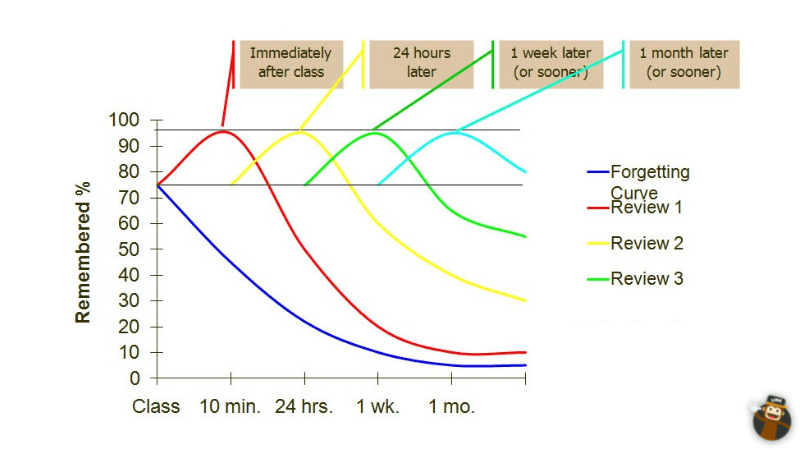
Let’s say you have just learned a new word in your target language. You should review it 5 minutes later, then again 7 hours later on the same day, then three days later, then ten days later, and then one month later. This repetition schedule is seen as the most efficient one to store vocabulary in your long-term memory. This schedule is designed based on the forgetting curve so that you can review the information just before you are likely to forget it.
Active Recall
MosaLingua uses a system of flashcards that requires more effort to recall but is much more effective. While learning new words or phrases, you first try to pronounce them correctly, turn the card over and see the correct answer quickly. It is an effective method to memorize vocabulary. That’s why most language learners use flashcards when they learn a new language.
Metacognition

MosaLingua takes the benefits of metacognition, which reflects on your thoughts. Before showing the correct answer, the app requests you to evaluate your memorizations on a scale of 1 to 4. Recent studies have shown that evaluating your learning process is quite beneficial for reinforcing your memory.
The Pareto Principle
What is the Pareto Principle? It can be explained that 80% of the effects come from 20% of the causes. This applies to almost every field of life, and it is especially true for learning languages. MosaLingua uses this principle to teach you the most common words and phrases. You can learn 1500 frequently used words in less than three months with the Mosalingua app.
The MosaLearning Method
The combination of all the above makes up the MosaLearning method. If you have enough motivation to learn a new language, you have no excuses left with this app.
Pros
- perfect for building up vocabulary
- useful words and phrases
Cons
- not free
- lacks appealing design
- grammar lessons can be improved
- not very useful for advanced learners
If you are interested in learning more about this, please check out our detailed review here.
Duolingo App: First Look
Honestly, who doesn’t know Duolingo? This platform has a wide range of language courses. It is a completely free language learning app, unlike other language learning apps. Duolingo app is based on a gamified teaching approach. The more you learn, the more points you earn, just like a game. Language lessons are easy to complete and supported with helpful illustrations. What’s more, Duolingo has been developing new features recently. Teachers can use Duolingo to enhance language learning in young learners and combine technology with education in their language classrooms.
Features Of Duolingo
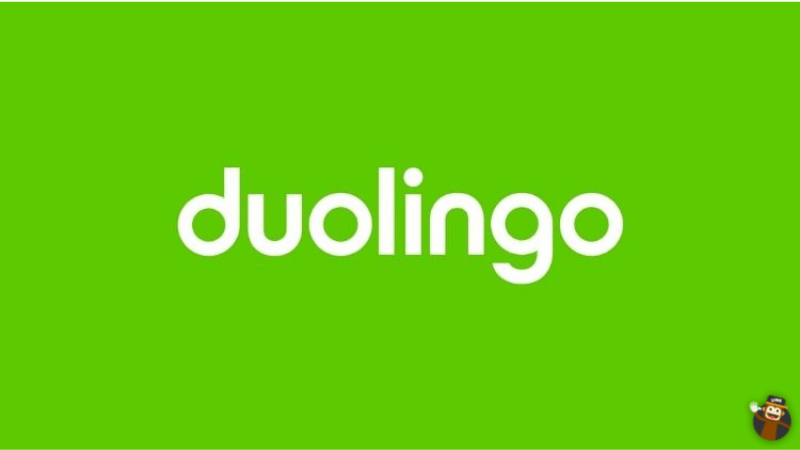
Lesson Design
You practice writing, reading, speaking, and listening in each lesson. The lessons follow the same patterns no matter how many lessons you have completed. All activities are based on translating between your target language and native language. I wouldn’t say I like this teaching method because there can be grammatical or contextual differences among languages, and making a translation word by word is not always a healthy approach.
Motivational Competition
You can compete with your friends on the Duolingo leaderboard and with 50 random Duolingo users each week. Duolingo Leagues are designed to motivate you to learn your target language. There are ten leagues in total, and only the top 10 learners level up to the next league, while the bottom ten learners are demoted to the previous league.
Short Stories
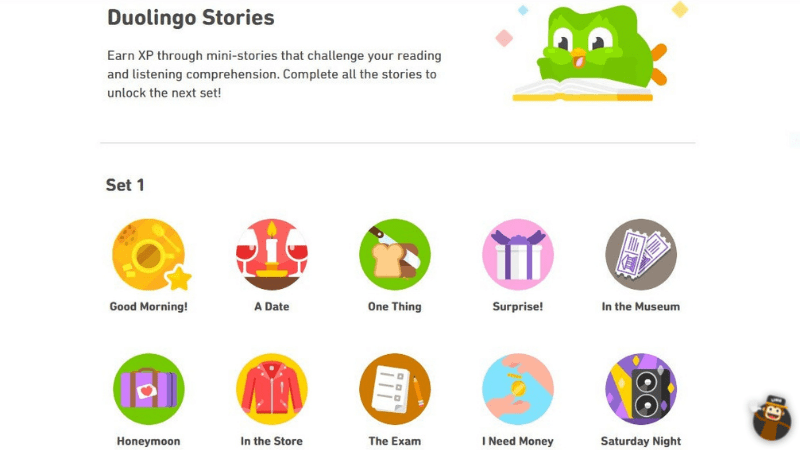
With Duolingo, you can read short stories on your proficiency level in your target language. There are different sets of stories that have different topics. The more you read, the more difficult they become. Like the checkpoints, each story turns into gold after you complete reading it but they can go back and reread them whenever you want.
Podcasts
Podcasts are a free feature that Duolingo offers to its users. Sadly, they are not available for every foreign language. It is only available in English, Spanish, and French. If you are studying one of these languages, you can try them out, and I am sure they will be quite helpful for listening comprehension.
Pros
- Content is completely free
- All language skills are covered
- Useful for beginner intermediate learners
Cons
- Lessons are repetitive
- Unuseful phrases
- Not useful for advanced learners
- Writing exercises can be improved for non-Latin alphabets
- Distracting ads
For a more detailed review of its features, check this out.
MosaLingua Vs Duolingo Conclusion
We have reviewed and compared two language learning apps thoroughly: Mosalingua and Duolingo. Both of them have positive and negative sides. We will not declare which app is better, but I hope we can help you find the most suitable language app. Let us know your thoughts about these platforms in the comments below!
The Best Alternative

If you are still undecided about which app to use, here is another language learning app for you!
The Ling App by Simya Solutions is a powerful language app offering more than 60 foreign languages. It has a gamified teaching approach with interactive language practices and activities. You can master your target language with all aspects such as reading, writing, listening, and speaking by using this app for only 7 minutes per day. Try it now!
